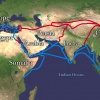Public administration
China's disinterested government and the rule of law
This article seeks to understand how China has managed to achieve such high rates of growth over the past four decades despite the absence of a veritable...
China's industrial policy, strategic emerging industries and space law
China’s transition economy experiment continues to rely heavily on state-driven industrial policy to structure the economy. In 2016, five-year plans on...
A little less conversation? Track II Dialogue and transboundary water governance
Foreign aid donors are increasingly investing in the good governance of freshwater resources in developing countries. One method used by many such...
Does growth in non-profit institutions improve government transparency? A case study from Vietnam
Non-profit institutions have long been believed to significantly contribute to good governance practice, particularly in transitional or authoritarian...
Curbing congestion and vehicular emissions in China: a call for economic measures
With the exponential growth of the national vehicle fleet in the last three decades, most cities in China are facing mounting pressure to tackle...
Age and gender group differences in employment responses to monetary policy shock in a small open economy: the case of Korea
A Factor Augmented Vector Autoregressive model is constructed in a way that it resolves the price puzzle problem and separately identifies domestic and...
Silk roads of the twenty-first century: the cultural dimension
Much has been written about China’s grand project of the twenty-first century, the Silk Road Economic Belt and the 21st Century Maritime Silk Road—or the...
The future of Hong Kong governance: the pro-independence legislators' election fallout and Beijing's political voice in Hong Kong
This article examines the activities, street-level and Legco tactics as well as the political orientation of the pro-autonomy advocates, localists and pro...
Managing risk and increasing the robustness of invasive species eradication programs
Invasive species eradication programs can fail by applying management strategies that are not robust to potentially large but non-quantified risks. A more...
Strengthening trade and health governance capacities to address non-communicable diseases in Asia: challenges and ways forward
Trade liberalisation is a driver of the rising burden of non-communicable diseases in Asia through its role in facilitating the growth of the region’s...
Pages
Updated: 28 July 2024/Responsible Officer: Crawford Engagement/Page Contact: CAP Web Team





















